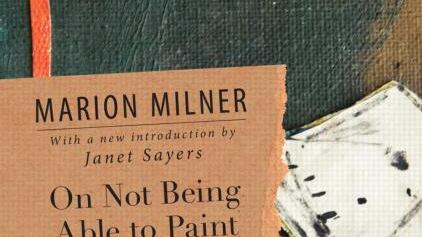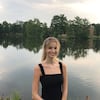On Not Being Able to Paint, Marion Milner
There is actually some clinical research behind why you vowed to write or crochet or immerse yourself in claymation with all your hours in quarantine and why it hasn't happened. Psychoanalyst Marion Milner's study, first published in 1950, is a classic of the genre, meditating on why it is that we have every intention to create and still trip at the first hurdle. Milner's writing is fluid and self-referential, reading like a finely crafted journal, and works through the disillusionment of creativity as she attempts to take up painting later in life. It may give some solace to those who have not spent the pandemic writing the next King Lear.
Theory of Colours, Johann Wolfgang von Goethe
If there were ever a time to read hundreds of pages of dense, philosophical poetry on color theory, it would be now—just maybe not all at once. Goethe's dissection of the color wheel is best consumed in small bites, a dozen pages or so at a time, if only to remind yourself that beautiful writing can be borne out of anything. Goethe writes that blue is a "kind of contradiction between excitement and repose" and that red "exhibits a bright landscape in so dreadful a hue as to inspire sentiments of awe." As you read the way Goethe interacts with color, as an artist and a critic, you may draw your attention to the finer points of whatever creative pursuit you have decided is your calling.
On Writing, Stephen King
It's not easy to write a good book on writing. The vantage point is already a losing game, with authors congratulating themselves on their successes and deciding it is their duty to educate the masses. Somehow, Stephen King pulls it off. Written in 2000, On Writing is both a memoir and a guidebook, doling out aggressively practical advice and brutal truths on "the craft," while reflecting honestly on the turbulent nature of his own career. It's a book that can be finished in a day, or even a long afternoon, and you'll be a better writer for it.
Too Much and Not the Mood, Durga Chew-Bose
In 1931, Virginia Woolf ended one diary entry questioning whether anything she could produce would be worthy of an audience, or worthy of writing at all. "I have no pen and not much to say," she wrote. "Or rather too much and not in the mood." It is from this sentiment that Durga Chew-Bose wrote her debut essay collection, which in the sum of its parts is an ode to the creative life. Woolf's words are repurposed for a new class of artists, and Chew-Bose is unself-conscious when she lapses into the personal—observations about love, heartbreak and identity are just as important as they were a century ago. Just embrace that the seesaw of self-importance will still be there.
A Backward Glance, Edith Wharton
While not necessarily a book about art, Edith Wharton's autobiography is certainly a book about creation and what it means to live a life creating. A Backward Glance is as rich and decadent as the fiction Wharton produced throughout her career. The first woman to be awarded the Pulitzer Prize for Fiction, Wharton reflects on both her public and private lives, and gives rare insight into friendships with Gilded Age artists like Henry James and Isadora Duncan—a testament to the idea that proximity to creativity may be just as important as natural born talent.

Guest Recommendation: The Sea, the Sea by Iris Murdoch
"Published in 1978, The Sea, the Sea is Iris Murdoch's 19th novel and won her the Booker Prize. It's been sitting on my shelf unread since approximately 2015 and turns out I was just saving it to read at the perfect time. It's about a lonely old man, retired theater director Charles Arrowby, who retreats from London to a house by the sea (the sea) and decides to write his autobiography. Something about how he piddles about his house and describes his sad meals with great detail and enthusiasm will strike the contemporary reader as…familiar. The book is long and baggy, but it's been such a balm to return to after another day of caregiving and quarantine. I've loved hanging out with proud old Charles Arrowby—he's washed up, in every sense, which is starting to feel relatable—and have cherished all the absolute havoc he's managed to wreak from within the confines of his crappy little house." —Meaghan O'Connell, author of And Now We Have Everything (2018).

